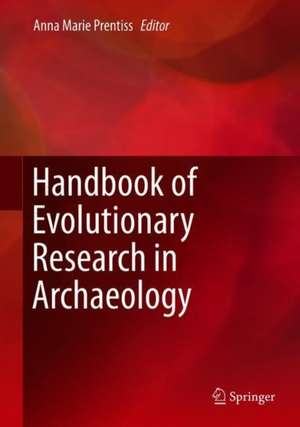Handbook of Evolutionary Research in Archaeology
Editat de Anna Marie Prentissen Limba Engleză Hardback – 14 iun 2019
Preț: 897.37 lei
Preț vechi: 1094.35 lei
-18% Nou
Puncte Express: 1346
Preț estimativ în valută:
171.79€ • 176.68$ • 142.52£
171.79€ • 176.68$ • 142.52£
Carte tipărită la comandă
Livrare economică 20 februarie-06 martie
Preluare comenzi: 021 569.72.76
Specificații
ISBN-13: 9783030111168
ISBN-10: 3030111164
Pagini: 505
Ilustrații: XII, 443 p. 67 illus., 24 illus. in color.
Dimensiuni: 178 x 254 x 28 mm
Greutate: 1.07 kg
Ediția:1st ed. 2019
Editura: Springer International Publishing
Colecția Springer
Locul publicării:Cham, Switzerland
ISBN-10: 3030111164
Pagini: 505
Ilustrații: XII, 443 p. 67 illus., 24 illus. in color.
Dimensiuni: 178 x 254 x 28 mm
Greutate: 1.07 kg
Ediția:1st ed. 2019
Editura: Springer International Publishing
Colecția Springer
Locul publicării:Cham, Switzerland
Cuprins
Microevolution.- Introduction to Cultural Microevolutionary Research in Anthropology and Archaeology.- Cultural Transmission and Innovation in Archaeology.- Natural Selection, Material Culture, and Archaeology.- Analyzing Cultural Frequency Data: Neutral Theory and Beyond.- Macroevolution.- Cultural Macroevolution.- Landscape Revolutions for Cultural Evolution?: Integrating Advanced Fitness Landscapes into the Study of Cultural Change.- The Uses of Cultural Phylogenetics in Archaeology.- Contributions of Bayesian Phylogenetics to Exploring Patterns of Macroevolution in Archaeological Data.- Cultural Macroevolution and Social Change.- Human Ecology.- Human Ecology.- Human Behavioral Ecology and Zooarchaeology.- Human Behavioral Ecology and Plant Resources in Archaeological Research.- Costly Signaling Theory in Archaeology.- Human Behavioral Ecology and Technological Decision-Making.- Demography, Environment, and Human Behavior.- Niche Construction Theory and Human Bio-Cultural Evolution.- Evolutionary Cognitive Archaeology.- A Brief Overview of Evolutionary Cognitive Archaeology.- Embodied Cognition and the Archaeology of the Mind: A Radical Reassessment.- Evolution and the Origins of Visual Art: An Archaeological Perspective.
Recenzii
“This volume covers a lot of ground at considerable depth. … readers of this volume should gain an excellent understanding of the current status of evolutionary research in archaeology in all its contradictions, complexity, and insight. … this compelling volume indicates that this approach proves extremely robust in explaining the development of human behavior.” (Christopher Morgan, American Antiquity, Vol. 85 (4), 2020)
Notă biografică
Dr. Anna Marie Prentiss is an archaeologist specializing in the prehistory of the Great Plains, Pacific Northwest, and Western Arctic regions of North America and Chilean Patagonia. She has a methodological specialty in lithic technology and theoretical interests in the archaeology of villages and towns, social inequality, hunter-gatherer mobility and technological organization, and the cultural evolutionary process. She is currently editor of the SAA Archaeological Record, the magazine of the Society for American Archaeology.
Textul de pe ultima copertă
Evolutionary Research in Archaeology seeks to provide a comprehensive overview of contemporary evolutionary research in archaeology.
The book will provide a single source for introduction and overview of basic and advanced evolutionary concepts and research programs in archaeology. Content will be organized around four areas of critical research including microevolutionary and macroevolutionary process, human ecology studies (evolutionary ecology, demography, and niche construction), and evolutionary cognitive archaeology.
Given a focus on theory and application the book does not seek comprehensive coverage of the full range of empirical work as measured temporally and geographically. Authors of individual chapters will address theoretical foundations, history of research, contemporary contributions and debates, and implications for the future for their respective topics. As appropriate and within space limits authors could present or discuss short empirical case studies to illustrate key arguments.
The book will provide a single source for introduction and overview of basic and advanced evolutionary concepts and research programs in archaeology. Content will be organized around four areas of critical research including microevolutionary and macroevolutionary process, human ecology studies (evolutionary ecology, demography, and niche construction), and evolutionary cognitive archaeology.
Given a focus on theory and application the book does not seek comprehensive coverage of the full range of empirical work as measured temporally and geographically. Authors of individual chapters will address theoretical foundations, history of research, contemporary contributions and debates, and implications for the future for their respective topics. As appropriate and within space limits authors could present or discuss short empirical case studies to illustrate key arguments.
Caracteristici
The first truly comprehensive introduction to evolution studies in archaeology
Will be immensely valuable for a wide range of archaeological, anthropological, and evolutionary students and scholars seeking summaries and discussion of the now many strands of evolutionary archaeological research
Chapters authored by a combination of bright early career and imminent senior scholars in the field from around the world
Will be immensely valuable for a wide range of archaeological, anthropological, and evolutionary students and scholars seeking summaries and discussion of the now many strands of evolutionary archaeological research
Chapters authored by a combination of bright early career and imminent senior scholars in the field from around the world
